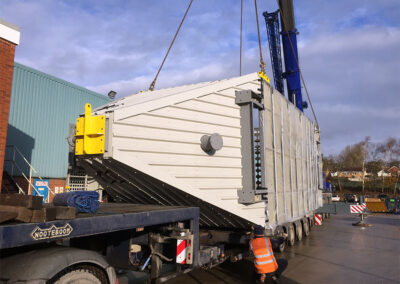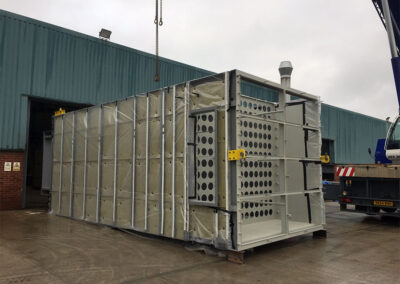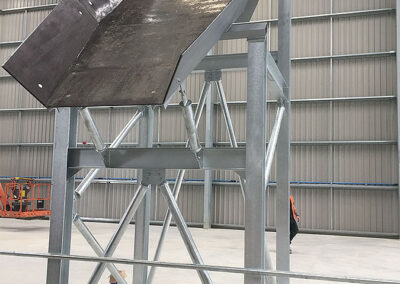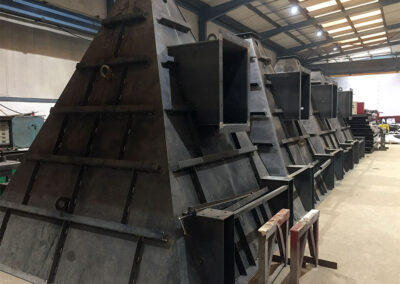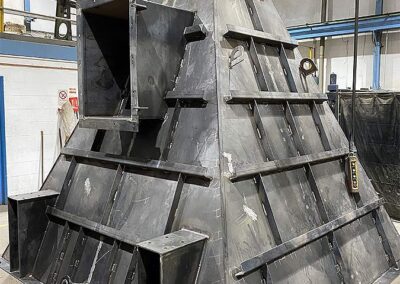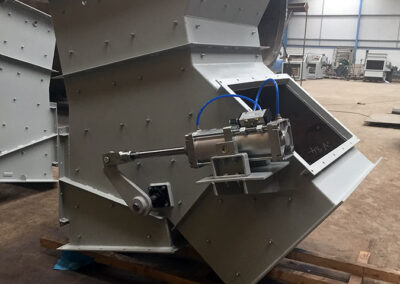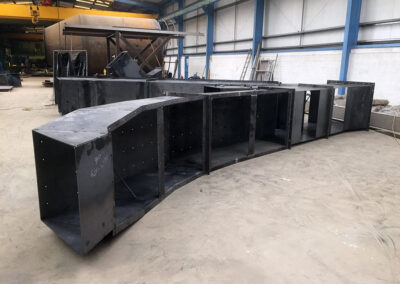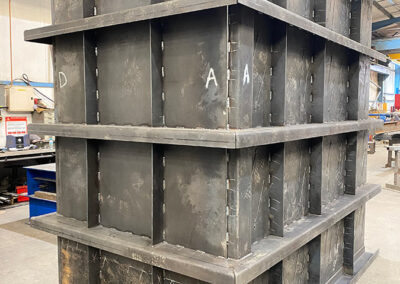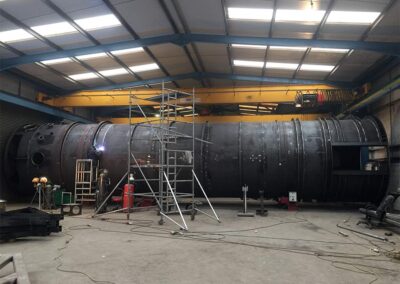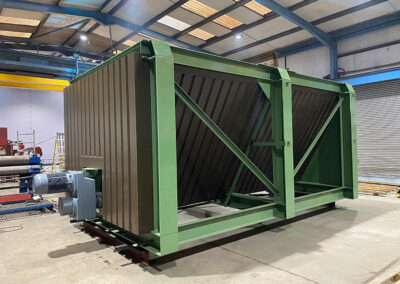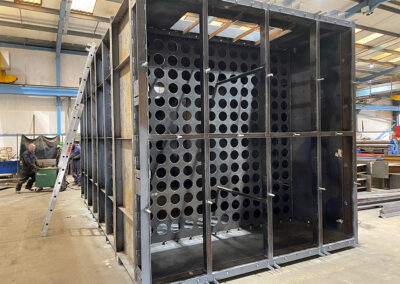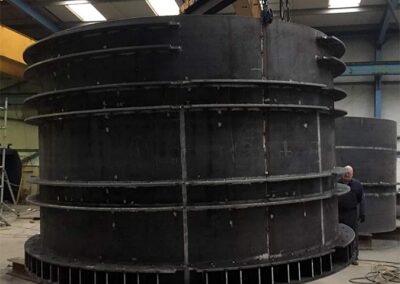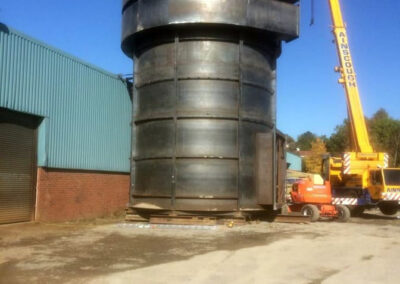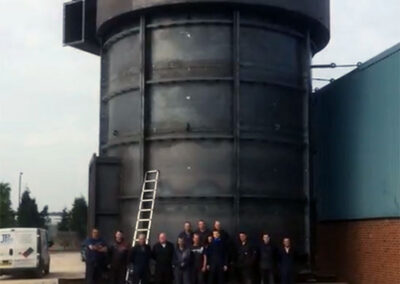
Metal Fabricated Hoppers, Silos and Tanks
JPen (John Patrick Engineering)
Hoppers
A strong customer base in the pharmaceutical and dry waste processing industry make regular use of JPen’s skill set in hopper design in both mild and stainless steel. In more recent times, the use of cromweld steel has been introduced as this alloy type offers anti-abrasion and anti-corrosion properties similar but less costly than high chromium content stainless steel. Hopper dimensions can vary greatly in their size and thickness, determined by the required flow rate and granular size.
Hoppers are fabricated for both internal and external locations, there are also a range of treatments including painting, powder coating and galvanising to offer protection against corrosion for mild steel fabrications. It is also possible for hoppers to have integrated view ports for the purposes of inspection and visual monitoring.
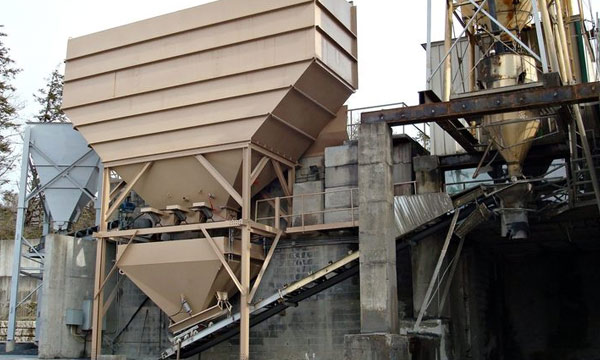
Silos
The solution to storing bulk materials is predominantly a silo, they have been in use in one form or another since around the 8th century BC; the most common application is found within the agricultural industry. Technological development has seen the humble silo historically being made from wood, leather and stone refined into sophisticated engineering designs utilising modern construction materials that are much more durable and easier to maintain.
Presently silos are predominantly constructed from either aluminium, mild steel, cromweld or stainless steel. The nature of the end use for the storage silo can dictate what it will be made from. Heavy industry tends to favour the popular mild steel. Paper mills, water treatment plants, oil and mining sectors are all regular customers who require mild steel silo fabrications. With the correct finishing and treatment, mild steel silos can endure a long functional life, minimising maintenance costs and any repair work.
Stainless steel silos are heavier and fulfil roles where contamination elimination and safe storage of perishable goods are required. Chemicals, wheat, water, juice are just a few examples of what is stored inside these units. The beverage, organic produce refinement and food manufacturing industries are amongst the widest groups of customers requiring stainless steel solutions. It was mentioned that chemicals can be stored in stainless steel, the higher grades of stainless material and the construction method/finish of the silo can strongly resist, pitting, crevice and stress forms of corrosion.
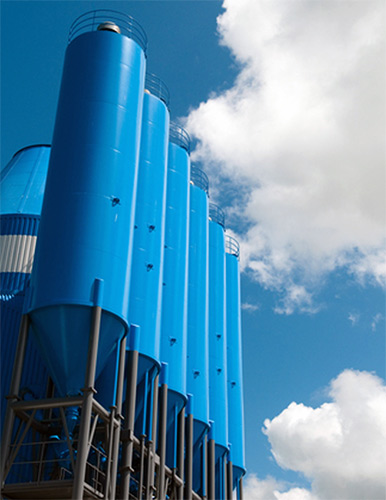
Tanks
With production meeting all the safety requirements necessary, JPen produces storage tanks for volatile liquids such as fuel and reactive chemicals, pressurised vessels, concrete batch processing, water and effluent storage. Tank dimensions and shapes are varied according to location, end use and engineering specifics, these include but are not limited to, spherical (high pressure fluids), cylindrical, fixed roof and underground storage tanks.
Like silos tanks can be fabricated in a selection of steels and aluminium if required. Stainless steel tanks are very much in demand for JPen customers in the brewery and fermenting business; it is absolutely critical that alcoholic beverages remain totally contaminant free during and after the various stages of the brewing process. Stainless steel is vital to avoid any flavour interference that would occur with the use of other materials. With aluminium it is necessary for the metal to be treated on the inside with a coating to prevent any reaction with the metal itself much the same way fizzy drink manufactures coat the inside of their beverage cans. Successive cleaning of the aluminium surface would degrade the coating, this makes it unsuitable for repetitive food and drink processing and storage tasks. Essentially most aluminium tank projects are best suited as a lighter weight solution for the storage of chemicals including acids, alkalines and oils.
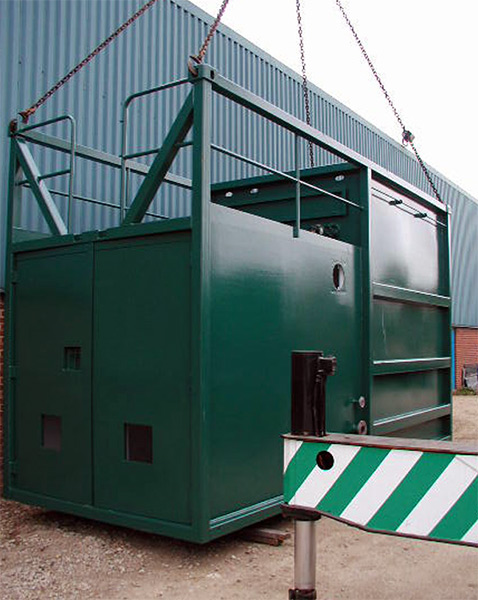
JPen Have Decades of Experience
With a very large and ever increasing portfolio of tank, silo and storage hopper fabrication projects completed, JPen have the sound knowledge and experience to provide the right solution in a timely, efficient, cost effective manner.
If you would like to enquire about your project with someone here please contact us.

